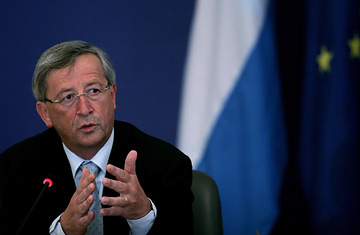
Jean-Claude Juncker
Europeans visiting the U.S. may be thrilled with the bargains they're finding thanks to the super-strong euro, but the American monetary policies that have permitted the dollar's continued decline are proving far less popular with economic officials across the European Union. In fact, shouts of protest are now rising from European economic chiefs demanding the U.S. take measures to reverse the dollar's slide.
This growing protest comes ahead of the Oct. 19 G-7 meeting in Washington, where European vexation over hands-off American attitudes toward the weakening dollar will be a main topic of discussion. Long a complaint aired primarily by the French, American willingness to allow the dollar to slip, which makes U.S. exports cheaper compared to foreign rivals, is now being denounced by a growing number of E.U. officials. Responding to the widening exchange rate gap from Luxembourg on Monday, Jean-Claude Junker — head of the Eurogroup of 13 nations who share the euro as their currency — complained about American indifference to dollar's slide.
"Europe cannot be the area of the world's economy to bear the consequences of others' inaction," Juncker told Reuters just hours after the dollar set yet another all-time record low against the euro of $1.43 late Monday. Juncker fears continued depreciation of the dollar will make exports from the euro zone too expensive for outside buyers. Such exports have played a major role in the E.U.'s recent economic recovery. "I will no longer accept that one considers it normal for Europe to accept at its own cost to manage the consequences of the existing global imbalances," he added.
Juncker's grumblings were preceded by similar criticism across Europe in recent weeks as the dollar dropped, including concerns voiced by German business leaders and economists who had long viewed a strong euro as a symbol of monetary rectitude. That crescendo of protest led France's Economy Minister Christine Lagarde to remind French economic daily Les Echos that Paris had long "sounded the alarm at the risk of irritating" more relaxed euro partners. She applauded signs that they had become "worried about the euro's level, and voiced their wishes to see concerted action" in response. Before the G-7 summit opens, Lagarde said she hoped to see "the entire Eurogroup adopt France's position."
Even if it doesn't, however, there's little chance U.S. officials will respond to the dollar's decline any time soon. David Naudé, euro-zone economist for Deutsche Bank in Paris, says there's absolutely no sign American authorities are ready to forsake the short-term trade benefits of what he calls "the policy of benign ignorance" toward the dollar.
In the absence of a reversal from within the U.S itself, Naudé says about the only thing the European Central Bank can do to undercut the dollar's slump is lower its own interest rates to create a degree of inflation to counterbalance any further rise in the euro's value. But that does nothing to undercut its appreciation outside the euro zone.
Along with many other economists around the globe, however, Naudé adds that letting the dollar's value decay in the medium and longer term will send a terrible message to foreign investors about the U.S. economy as a whole. "In wider terms, the dollar reflects the richness of the American economy, and a cheapened, sliding dollar will eventually send the same economic image out abroad," Naudé says. That could influence the foreign banks and give investors injecting $3 billion worth of capital required every day to keep the U.S. economy growing second thoughts about where they place their money. Conversely, a cheap currency reflecting a cheap economy, Naudé remarks, "could also leave U.S. companies very vulnerable to foreign buyers who figure they can pick up big American assets at a minimal price."
For those reasons, Naudé predicts U.S. policy will eventually move to buck up the dollar against the euro and other currencies once again. Just don't look for that to happen any time soon — or as a result of European pressure.
